|
“Infrastructure development is a catalyst for economic development but is often accompanied by strikes from communities, business forums and criminal activities by construction mafias. At the centre of this instability is the demand for meaningful participation by communities in the labour and business opportunities inherent in infrastructure projects,” said Newton Baloyi, Vice President of the Association of South African Quantity Surveyors (ASAQS) at the recent Western Cape Property Development Forum Conference held in Cape Town.
While the ASAQS welcomes the announcement of the establishment of the Broad-Based Black Economic Empowerment Advisory Council by President Cyril Ramaphosa, it however notes with concern that the panel seems not to have any representation from the built environment professions or construction sector procurement, despite the critical nature of infrastructure to South Africa’s economic recovery and development, and the high levels of instability and community disruptions on infrastructure projects. B-BBEE in the construction sector has specific unique challenges that need urgent attention. “The missing link is that our infrastructure procurement regulatory framework does not go far enough in addressing the socio-economic concerns of communities,” Baloyi said. “We need other mechanisms for measuring the performance of infrastructure projects. We must go beyond the delivery of just physical infrastructure to delivering socio-economic impact and inclusive community development.” Baloyi told the conference and supported his statement by sharing the findings of a pilot project he conducted. The pilot was based on a project set aside for the community. The findings showed that the benefit of the project to the community could be increased from 6 cents to 40 cents per Rand spent on the project and the payback period reduced from 17 years to 2.5 years. This meant that the benefit to the community could exceed the client’s procurement spent in just over 2.5 years. In addition, the social return on investment (SROI) would be improved from a negative 94% to a positive 60%. According to Baloyi, there are four interventions required to achieve these kinds of results for the construction sector. Firstly, a mindset shift to integrate impact measurement into construction projects. Secondly, integrate impact delivery into infrastructure procurement practices and legislation. Thirdly, establishing sector community capacity development programmes that enable meaningful community participation in projects rather than the current project-by-project approach. Lastly, proactive establishment of community buy-in based on the shared impact objectives of projects. “These four interventions must be coordinated and integrated into projects; having one without the other does not work,” Baloyi warned. The failure to integrate the four interventions is where B-BBEE fails communities and the construction sector. “Communities expect participation with or without capacity, otherwise there will be strikes,” said Baloyi “Yet, there are no sustainable capacity building programmes for community businesses and skills. The financial support needed by local businesses can hardly be accessed within the life of a project.” “These are systemic challenges that cannot be solved by social facilitators on construction projects, nor by a developer or contractor on a project-by-project basis. These challenges play a significant role in project delays, poor service delivery, budget overruns and delayed economic development. We hope that the B-BBEE advisory council will go a long way in addressing the fragmented approach to B-BBEE and foster the integration proposed herein.” “Given the high levels of poverty, inequality and especially youth unemployment and the negative economic outlook of South Africa, urgent interventions are required to avert intensified and violent strikes in the construction sector. Low hanging fruits include the establishment of an initiative led by the construction sector that integrates all stakeholders in the built environment to establish a voluntary pilot that can inspire hope in communities and reassure them that their concerns are being addressed.” “Rather than theorising about transformation, let’s do it in real-time and with real results as the built environment,” Baloyi told the conference as he called on developers, built environment professionals and contractors to amalgamate their skills development, supplier and enterprise development and SED/CSI resources to establish such a pilot linked to their portfolio of projects. He suggested that it is time for the built environment professionals to lead the transformation agenda in the construction sector. “We are the experts in infrastructure procurement and strategies and not government”. ENDS MEDIA CONTACT: Stephné du Toit, [email protected], 084 587 9933, www.atthatpoint.co.za For more information on ASAQS please visit: Website: www.asaqs.co.za LinkedIn: linkedin.com/company/asaqs Twitter: @the_ASAQS Facebook: facebook.com/asaqsza
0 Comments
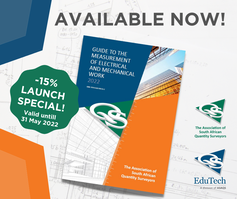 What part should the quantity surveyor play in the procurement and management of Electrical and Mechanical(M&E) services? This has been a vexed question for many years and remains a contentious subject when both engineers and quantity surveyors vie to include the procurement, administration and cost management of M&E services in their respective appointments. Some clients insist on one or the other consultant being responsible, while other clients show no preference and leave it to the consultant team to resolve. From a quantity surveyor's point of view, where M&E services make up a significant proportion of the overall building cost – say anything above 10 to 15% - it is essential that the quantity surveyor takes responsibility for the financial management and cost control of the entire project and not limit their service to the “building works” alone. Such financial management can only be effective if the quantity surveyor is involved from estimating stage right through to final account, in close cooperation with the respective engineers responsible for the design of the M&E services. In larger, more sophisticated projects, the mechanical, electrical and electronic services, including security services, smoke detection, fire protection and the like can make up 40% or more of the project value. It is generally accepted that bills of quantities are essential for proper pre- and post-contract cost management and that it is not possible to effectively cost manage projects, or part thereof, in the financial vacuum that exists when tenders are called for on the basis of drawings and specification alone. Bills of quantities introduce a discipline from tender stage through to final account stage which provides the tool to contain the cost within a significantly narrower band. Copies can be ordered at -15% launch discount until 31 May 2022 on: https://www.asaqs.co.za/store/viewproduct.aspx?id=20054358 ENDS MEDIA CONTACT: Stephné du Toit, [email protected], 084 587 9933, www.atthatpoint.co.za For more information on ASAQS please visit: Website: www.asaqs.co.za LinkedIn: linkedin.com/company/asaqs Twitter: @the_ASAQS Facebook: facebook.com/asaqsza The Association of South African Quantity Surveyors (ASAQS) has welcomed the announcement by President Cyril Ramaphosa, that the government is setting up a special police unit to deal with the construction mafia that has been disrupting businesses in the country for years. ASAQS have made numerous calls since 2019 for SAPS to get involved in the matter, as the issue affects infrastructure projects, investor confidence, and the safety of professionals in the built environment.
The construction mafia entails gangs who intimidate foremen, project managers and construction bosses by going onto project sites and demanding a stake. The result? Construction projects worth at least R25bn being violently disrupted and halted in South Africa. According to Newton Baloyi, ASAQS Vice President, the President’s announcement is welcome. "With the police taking over the criminal element, professionals in the built environment will be able to focus on the fundamental reason for local community dissatisfaction when large projects are involved." Preventing Disruption is better than Cure According to Baloyi, disruptions in the construction sector are not limited to mafias. “It usually happens the moment labour and companies from outside the local communities are appointed to projects. The local community gets upset, as they feel deprived of opportunities for meaningful economic participation”. He explains that this can be expected, as many of these mega projects are being done in environments where people live in poverty, are unemployed, and looking for opportunities. Baloyi believes that a shift in mindset is required to fully address the issue. “A mindset shift is required wherein projects are evaluated and monitored not only on the basis of technical and financials, but to include socioeconomic impact. Clients and built environment professionals must realise that projects are actually an opportunity for the deliberate socioeconomic upliftment of communities. Instead of simply ticking the boxes of compliance, we should focus on real impact”. A Plan for Community Involvement Baloyi says the first step to meaningful community involvement is to integrate social and economic sustainability into the planning of projects. "In order for integration to happen, the project procurement strategies should proactively identify opportunities for the localisation of project value chain. This can be best handled by built environment professionals as part of the project development process. It's critical that a project is developed and marketed in such a way that local communities have a say and a sense of ownership," he notes. "All too frequently, the buck is passed on to the contractor. But the engagement with the community shouldn’t start when the contractor arrives on site. It must come from the developer and his professional team prior to the arrival of the contractor.” He says the project teams should go beyond simply subcontracting and labour. “We need to think beyond that and consider other high impact opportunities for maximum circulation of money in the communities, such as, the part localisation of material supplies, manufacturing, assembly, unbundling projects and ringfencing opportunities for the local communities.” Baloyi concludes by adding that once a community has taken project ownership, it becomes easier for those communities to identify criminal elements. “They are then personally committed to the project and part of its beneficial elements. They are not only uplifted, but they also invest economically and socially. Those are the kinds of initiatives that have a significant impact." ENDS MEDIA CONTACT: Stephné du Toit, [email protected], 084 587 9933, www.atthatpoint.co.za For more information on ASAQS please visit: Website: www.asaqs.co.za LinkedIn: linkedin.com/company/asaqs Twitter: @the_ASAQS Facebook: facebook.com/asaqsza 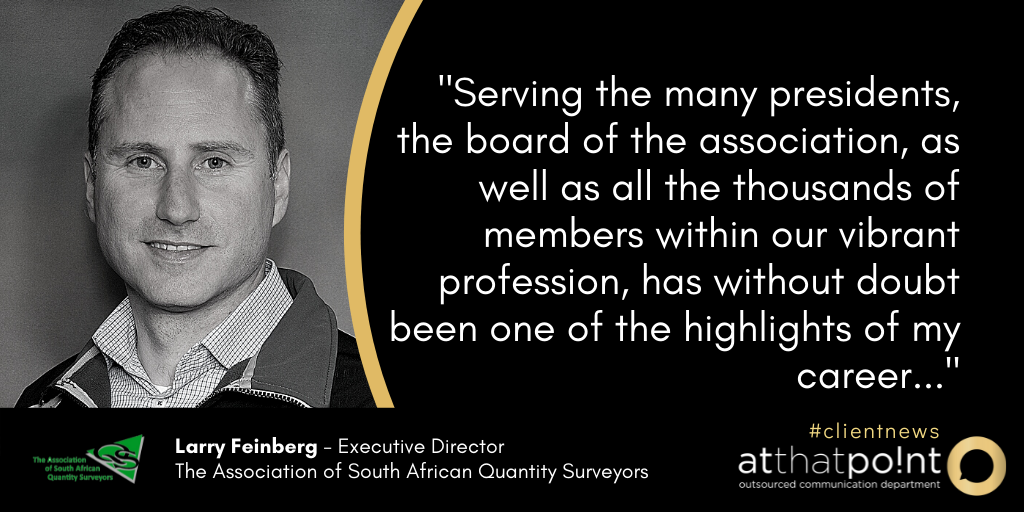 Larry Feinberg is set to end his decade-long term as Executive Director of the Association of South African Quantity Surveyors (ASAQS) in February 2022. Prior to leading the ASAQS, Feinberg served as Regional Manager for Africa at the Charted Institute of Building (CIOB). Under Feinberg’s leadership the ASAQS implemented holistic governance processes, internal administrative policies, procedures and workflows based on recommended best practice. These changes were made to combine the rich 114-year history of the ASAQS with robust systems that are imperative to today’s business environment. During his term as Executive Director, Feinberg was also instrumental in successfully facilitating the inclusion of South Africa as an Associate Member of the Pacific Association of Quantity Surveyors (PAQS), as well as the signing of Memoranda of Understanding with Hong Kong, Malaysia, Australia, Canada, New Zealand, Royal Institute of Chartered Surveyors (RICS), Malaysia, and the Philippines. Other collaborative partnerships established during Feinberg’s term include the Joint Building Contracts Committee (JBCC), Africa Association of Quantity Surveyors (AAQS), Construction Sector Charter Council (CSCC), and all Voluntary Associations and Statutory Councils within the built environment. The local Quantity Surveyor profession has also benefited from the establishment of the EduTech Division of the ASAQS. The division is responsible for the delivery of all training programmes, the drafting of QS-specific technical documents, and answering any technical related queries. “Serving the many presidents, the board of the association as well as all the thousands of members within our vibrant profession, has without doubt been one of the highlights of my career, and I would like to express my sincere gratitude for the trust and the faith that our members have all placed in me. I reflected on this almost daily while in office and it proved to be an endless source of motivation and encouragement to me. It was the light that always lit the road ahead”, says Feinberg. The ASAQS Board has started the process of recruiting a new Executive Director. ENDS MEDIA CONTACT: Idéle Prinsloo, [email protected], 082 573 9219, www.atthatpoint.co.za For more information on ASAQS please visit: Website: www.asaqs.co.za Facebook: facebook.com/asaqsza Linkedin: linkedin.com/company/asaqs 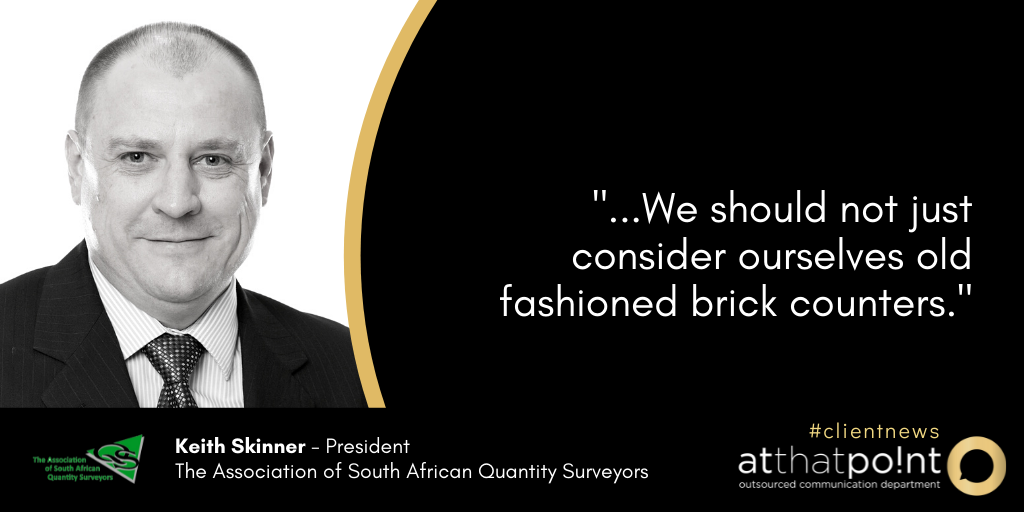 The quantity surveyor of today is far more than simply a “brick counter”. Their role is to keep a close eye on project finances and contractual relationships. “They make sure that the financial position of construction projects is accurately reported and controlled effectively,” Keith Skinner, President of the Association of South African Quantity Surveyors (ASAQS), said at the association’s recent Virtual Presidential Tour and Awards Ceremony. The profession is anything but stagnant and has been evolving at a rapid pace. Yet, the core principles have remained the same. “The quantity surveyor of today remains professional and unwavering in their approach to project governance,” he told ASAQS members during the virtual event. Referring to a Google search of the definition of a quantity surveyor who is described as a person who calculates the amount of material needed for building work, and how much it is going to cost, Skinner noted this may be the case of an average quantity surveyor in other countries, but certainly not locally. The True Role of Quantity Surveyors In South Africa the definition of a “construction cost consultant” or a “commercial manager” defines the role of our quantity surveyors far better in terms of the service they offer. “We are often associated with the construction or real estate sectors. However, we operate across different sectors. We have developed and delivered some of the best mining quantity surveyors in the world, and they find themselves in high demand.” He referred to the PwC annual mining report that highlighted the fact that the sector contributed 6.7% to South Africa’s Gross Domestic Product (GDP) last year and 7.6% this year. The sector created and sustained more than 1.6 million jobs last year and 2.3 million this year. “We have come from measuring brick walls to being involved in projects for a new mine shaft, a mine lift installation, or a new ship or units for Arctic expeditions. We should not just consider ourselves old fashioned brick counters.” Remaining Agile Larry Feinberg, executive director who has been with the ASAQS for ten years, said the association strives to maintain the highest professional standards, ensure ethical conduct and integrity in the profession; and to advance the common interest of the members. The key strategic objectives over the next three years are to ensure that the association remains agile and that it strengthens its brand and industry standing. “Over the past decade we have been flexing our muscles, weighing-in and having our professions voice heard, and taking “positions” on industry specific matters unapologetically when the situation demands this. Our association has also taken appropriate criticism over the last decade and responded with the necessary action or correction when required,” he added. EduTech has created a custom-made Continuous Professional Development (CPD) program which ensured that our members stayed on top of their game, despite Covid-19 restrictions. The program offered 20 webinars equating to 66 CPD hours. Members were able to take their pick from this “incredible value proposition” for a once-off fee of R750.00 compared to the average cost of over R400 per CPD hour in the preceding years, said Feinberg. Awards Karl Trusler, the association’s EduTech director, also announced the winners of the three annual awards that recognise the achievement of top quantity surveyor students.
SACAP and SACPCMP Clarify Routes to Registration for Building Inspectors & Building Control Officers in South Africa
Gauteng, November 2021: In this joint statement, the South African Council for the Architectural Profession (SACAP) and the South African Council for the Project and Construction Management Professions (SACPCMP) would like to clarify any confusion caused as a result of the registration categories/disciplines developed recently by the two councils. SACAP and the SACPCMP have come together to release a joint statement that details the registration categories, ensuring that Built Environment professionals have a clear understanding of the roles, requirements and routes to registration for each discipline. Prior to the development of the registration categories, months of industry-related research pertaining to Building Inspectors’ scope of work and responsibilities was undertaken by the National Home Builders Registration Council (NHBRC). In December 2019, the SACPCMP officially launched two registration categories for Building Inspectors and these were carefully developed by an SACPCMP-led task team comprising of representatives of Government, Academia and the Public Sector. Coinciding with the launch and the finalisation of Building Inspector registration, SACAP also developed and launched the registration of Building Inspectors and Building Control Officers (BCOs). This caused confusion within the industry which further developed during a set of roadshows that were undertaken across the country where prospective Building Inspector applicants noted their uncertainty in terms of where to register, and with which professional body. In order to clarify the confusion, a meeting chaired by the Council for the Built Environment (CBE) resolved that SACAP would register only Building Control Officers, while the SACPCMP would register Building Inspectors under the categories mentioned herein. Who should Register as a Building Control Officer? Any person appointed in terms of section 5 (1) of the National Building Regulations and Building Standards Act 103 of 1977 (as amended). SACAP Route to Registration (Building Control Officer): Step 1 Submission of the online application (Certified copies ID/Passport, Proof of appointment and qualifications. Up to date CV and payment of application fee. Step 2 SACAP assessment of the application (registration is based on qualification/experience/ Knowledge and capability) Step 3 Compliance with continuing professional development Registration as a Building Control Officer can be done via SACAP’s website, www.sacapsa.com Who should Register as a Building Inspector? The SACPCMP officially launched two registration categories for Building Inspectors: • Professional Building Inspector (PrBInsp) • Certified Building Inspector (CBInsp) The above-mentioned categories would apply to all Building Inspectors, whether they perform regulated inspections or whether they work in/or with National, Provincial or Local Government departments, or with the NHBRC – Professional Building Inspectors register via the SACPCMP. SACPCMP Route to Registration (Building Inspector) Step 1 Submit online application Pay application fee Step 2 Screen / validate / identify registration route Step 3 Pay examination fee, write exam / obtain positive outcome Step 4 PrBinsp: Peer review interview / positive outcome / pay registration and annual fee - designation awarded Registration as a Building Inspector can be done via the SACPCMP’s registration portal, https://mybi.sacpcmp.org.za/ ENDS SACAP Media Enquiries: Ntokozo Masango: Stakeholder Relations Manager Email: [email protected]SACPCMP Media Enquiries: Natasha van der Berg: Stakeholder Relations and Communications Email: [email protected] About SACAP The South African Council for the Architectural Profession (SACAP) is the official regulator for the architectural profession with over 10 000 registered architectural candidates and professionals. For more information, visit www.sacapsa.com About the SACPCMP The South African Council for the Project and Construction Management Professions (SACPCMP) is empowered by section18 of Act No.48 of 2000 to certify, register and regulate the Project and Construction Management Professions. For more information on the SACPCMP, visit www.sacpcmp.org.za. “In the wake of the July incidences of looting and destruction, we need to rethink the role property development can play in addressing a variety of socio-economic issues in South Africa,” says Mosha Senyolo, newly elected Vice-President of the Association of South African Quantity Surveyors (ASAQS). “Before we can talk about feasible solutions, we must first understand the unique South African problem that we actually need to solve.”
“Saying that no one would want to invest in South Africa due to socio-economic instability isn’t likely to inspire those in need of help to make different choices,” says Senyolo. “We should rather have conversations about how we are going to get people to understand how infrastructure and property developments coming from outside their community benefit them.” “In addition to this, social responsibility should be at the forefront when rethinking how the sector approaches property development, for example,” says Larry Feinberg, Executive Director of the ASAQS. “To sustainably address the unique South African challenges, the property sector will be required to take on social responsibility that goes beyond just – for example – skills development.” This proposed focus on increased social responsibility aligns to the ESG trend where investors consider not only the financial return, but also the environmental, social and governance aspects of projects and companies they invest in. “There are opportunities to assist people to start businesses and allow them to thrive without the usual capital constraints that goes with running a business that requires a physical location.” “For example, an office space developer could allocate a small rent-free portion to a business that just needs a physical location at a great address to give them an edge,” explains Feinberg. Similarly, a retail developer could allocate a small rent-free portion to spaza-type shops, allowing the shop owners to benefit from the foot traffic of the established brands located in the mall.” “Collaboration between the public and private sector will be key to bringing these important changes about,” says Senyolo. Keith Skinner, newly elected ASAQS President, agrees with Senyolo. “Going forward, social responsibility and local community inclusivity are key to new property developments providing good returns in respect of benefits to the community, planet and being profitable investments.” “We can’t wait for some undefined point in the future; we need to rethink our approach to the inclusion of local communities in the new property developments process now!” According to Skinner, Quantity Surveyors can support the inclusion of local community involvement in the construction phases of a project without it necessarily being a financial burden to the project. The education, training and knowledge base required of Professional Quantity Surveyors (PrQS) equips them to implement clearly defined – and well documented – procurement processes. “Quantity Surveyors are well placed to effect and manage financial governance and reporting processes on projects,” explains Skinner. “Thorough financial control minimises opportunities for fruitless expenditure and corrupt activities, thus ensuring that funds are utilised efficiently, and to the maximum benefit of both investors and communities.” ENDS MEDIA CONTACT: Stephné du Toit, [email protected], 084 587 9933, www.atthatpoint.co.za For more information on ASAQS please visit: Website: www.asaqs.co.za Facebook: facebook.com/asaqsza Linkedin: linkedin.com/company/asaqs The list of companies that were awarded contracts by government for the supply of goods and services related to the Covid-19 pandemic include details on personal protective equipment (PPE) contracts. Provincial expenditure disclosure reports however indicate that as much as – or even more – has been spent on infrastructure projects but very little detail is provided to compare these costs to industry norms.
From April to July 2020 Gauteng spent R2,112bn on PPE and R2,977bn on infrastructure. As at 27 July 2020 the reported expenditure for KwaZulu Natal amounts to R800mil on PPE and R1,139bn on infrastructure. The Western Cape report provides information on PPE expenditure only and not on infrastructure projects. These projects included upgrades and alterations to health facilities and education facilities as well as the establishment of field hospitals, quarantine and isolation facilities. The expenditure reports provide detailed information on the unit of measure, price per unit and quantity required on the procurement of PPE for contracts from as little as R1000. The reports however include very little detail on the specifications for the infrastructure projects and how they were procured. These details are used by those that assign tenders to benchmark quoted costs against prevailing market prices and Treasury norms. This comparison helps to identify inflated prices and related irregularities. However, on the infrastructure projects, only a single amount together with a very brief description of the work is provided. This lack of detail does not allow for a basis to benchmark these costs against market norms. It is therefore extremely difficult to determine whether government obtained the expected value from the infrastructure expenditure. Lack of understanding causes lack of outrage The skewed focus on the reported irregular expenditure on PPE is most likely due to a general lack of understanding of how detailed infrastructure procurement management and project delivery really is. It is for this reason that the Quantity Surveying profession is seeking responses to key questions that will expose any irregularities if applicable. According to the Association of South African Quantity Surveyors (ASAQS), a Quantity Surveyor is the member of the professional consultant team responsible for managing all financial aspects on construction projects from start to finish. In the public sector they are also responsible for preparing procurement documentation on behalf of organs of state. Quantity Surveyors ensure that tenders are awarded to building contractors at market related prices which are benchmarked against industry rates. They also verify that the work done by the contractors is based on actual performance before payment is released to the contractor. Government must caution against writing blank cheques for infrastructure projects In the Gauteng expenditure report 15 health infrastructure projects are listed without any names of contractors or of the core professional consultant team consisting of quantity surveyors, architects, engineers and project managers. In the KwaZulu-Natal Report infrastructure expenditure refers to contractors only. With no indication of the involvement of professionals in the documents available in the public domain it could easily be assumed that none were appointed. If this is indeed the case, then it is highly possible that the procurement and management of these projects lacked the required independent and professional oversight. This is especially concerning when expenditure on Covid-19 infrastructure exceeds that of total PPE procurement – without the same amount of public outrage. It is of utmost importance to the South African economy to ensure that Covid-19 infrastructure projects were awarded and completed in a fair, equitable, transparent, competitive and cost-effective manner even though emergency procurement was necessary at the time. Departments responsible for infrastructure projects should ask several questions to establish whether due process was followed in awarding Covid-19 infrastructure tenders. The answers provided to these questions should be reviewed by competent, registered built-environment professionals in order to determine “fit for purpose” decision-making and to identify any irregularities or non-compliance. The ASAQS, through its members and provincial chapters, is ready to assist investigative agencies to identify and quantify any fraud and corruption on Covid-19 infrastructure projects. ENDS EDITOR’S NOTE: For the sake of brevity we have excluded from the main body of this media release the list of questions departments responsible for infrastructure projects should ask to establish whether due process was followed in awarding Covid-19 infrastructure tenders. We include these questions below for your convenience:
MEDIA CONTACT: Stephne du Toit, 084 587 9933, [email protected], www.atthatpoint.co.za 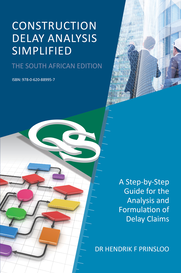 Property developers, construction owners, Quantity Surveyors, and contractors face many challenges as they navigate through mostly uncharted territory with their projects experiencing mounting risks from the effects of COVID-19. Dr Hendrik Prinsloo, former Senior Lecturer at the Engineering, Built Environment and Information Technology of the University of Pretoria, recently published his book entitled Construction Delay Analysis Simplified: A Step-by-Step Guide for the Analysis and Formulation of Delay Claims. Christelle Bown, President of the Association of South African Quantity Surveyors, says the book provides the much-needed guidance the industry is looking for to make sure that delay claim-assessment processes are managed in a way that is fair and transparent to employers and contractors. “Across the globe, construction projects are impacted by the pandemic in myriad ways including reduced or compromised the availability of materials, slow-downs in production rates, non-availability of specialist resources, site closures where the number of infections is high, and a reduction in the availability of labour due to compromised health workers, among other challenges. Dr Prinsloo’s new book succeeds in simplifying the many complexities associated with the delay claim-assessment process at a time when we need it most,” says Bown. Localising international best practices for delay claims Dr Prinsloo, who now resides in San Diego, conducted intensive research on delay claims over many years, and this research produced a groundbreaking New Delay Analysis and formation method. The method, which is covered in the book, has been presented at numerous international conferences and is being in several countries. The ASAQS, who has worked closely with Dr Prinsloo over the years, is co-publishing a South African version of the book. “The book gives guidance on how disputes can be minimised, and it is written in such a way that it can be used for an in-depth study into delays or as a quick reference guide for the assessment or formulation of delay claims. Dr Prinsloo was a panellist on a recent ASAQS webinar about the contractual consequences of COVID-19 and attendees – including myself – were impressed by his knowledge on this topic. We are excited to launch the co-published version of his book to the local built environment,” says Bown, who was invited to write a foreword for the book. Formulating delay claims for JBCC and FIDIC contracts Professor Tinus Maritz, CEO of the Joint Building Contracts Committee (JBCC), who also wrote a foreword for the book, says the book is particularly helpful in how it gives guidance on how delay claims analysis is formulated using the JBCC and FIDIC standard forms of contract. “Dr Prinsloo’s book ensures that the delays experienced on construction projects, which in most cases might be excusable delays, are dealt with and analysed fairly and transparently. It provides a better understanding of the administration and good practice in this particular area of contracting, and it will undoubtedly be used by many practitioners, clients, contractors, and subcontractors throughout South Africa and its neighbouring countries,” says Maritz. An industry-wide invitation is open to all, to attend for free, a webinar presented by Dr Hendrik Prinsloo on Construction Delay Analysis from 2:00-5:00 pm on Wednesday the 12th August and repeated on Tuesday the 22nd September 2020. To register for these webinars, please click HERE. To order your copy, contact Gwen Mlondobozi at the ASAQS on [email protected] ENDS MEDIA CONTACT: Stephne du Toit, 084 587 9933, [email protected], www.atthatpoint.co.za For more information on ASAQS please visit: Website: www.asaqs.co.za Facebook: The Association of South African Quantity Surveyors Initiated at a meeting held in the offices of the International Monetary Fund in Washington in 2015, the International Construction Measurement Standards (ICMS) presents the opportunity to make a meaningful comparative analysis of construction costs between countries on a global scale, not least by international organisations such as the World Bank Group, the International Monetary Fund, and various other funding institutions, government and non-government organisations and the United Nations.
Given the interest by international funding intuitions for global consistency in construction cost reporting, as advocated by the ICMS, Karl Trusler, EduTech Director at the Association of South African Quantity Surveyors (ASAQS), says the government’s planned infrastructure roll-out makes it necessary for Quantity Surveyors to be open to expanding some of their cost reporting methods. “With President Cyril Ramaphosa receiving a “firm commitment” amounting to billions of rands for the 55 bankable infrastructure projects, it is essential to know what reporting standards the big lenders will accept when reviewing project proposals. South African Quantity Surveyors who want to do work across borders or overseas will also benefit from familiarising themselves with the ICMS, as global consistency in construction cost benchmarking is becoming increasingly sought-after among critical stakeholders in the international built environment,” says Trusler. What is the ICMS? The ICMS is an international standard that aims to provide greater global consistency in classifying, defining, measuring, analysing and presenting construction costs at a project, regional, state, national, or international level. It isn’t a detailed method of measuring construction works. Instead, it is a high-level benchmarking and reporting framework for international cost classification, reporting, and comparison. “Project developers and financiers want to be able to compare apples with apples when reviewing project costs across the globe. The data bank of crucial information provided by the ICMS enables informed decision-making. Although not mandatory, the ICMS is likely to become an increasingly valuable requirement for South African Quantity Surveyors who are involved on large infrastructure projects that are funded by foreign investors,” Trusler says. The first ICMS was launched in 2015 and it was a guideline for reporting on the capital investment costs of a project. Last year, the ICMS Coalition – which consists of 45 organisations from around the world and 27 Standards Setting Committee members - published the second edition of the ICMS. A benchmark for international lifecycle cost reporting “The new ICMS provides a lifecycle cost reporting guideline so that developers and infrastructure owners know how their investments will perform once they are operational. This type of information is crucial for both private and public-sector role-players who are more motivated than ever before to invest in the development of world-class infrastructure,” says Trusler. Among the 55 projects that government has earmarked for development is an aviation park near Upington, a smart city in Lanseria, a R3.1-billion Space Infrastructure Hub, a 516-hectare citrus farm in the Eastern Cape, and a water project that includes some 160km of pipe, and pump stations to get water to Eskom’s large power stations, Medupi and Matimba, among other projects. There is sufficient overlap between the current cost reporting methods that Professional Quantity Surveyors use and the ICMS, so we are working towards delivering a solution that enables the ICMS report to be generated in parallel with the way we currently do cost reporting in South Africa. I look forward to helping members embrace and benefit from this solution,” concludes Trusler. An industry-wide invitation is open to all, to attend for free, a 1-hour live international panel discussion on the ICMS from 4:00 – 5:00 pm on Tuesday the 1st September 2020. The panel will comprise of Justin Sullivan (ICMS Coalition Chair) Ken Creighton (ICMS Coalition Past Chair) Gerry O’Sullivan (Standards Setting Committee Vice-Chair) and Julia Dela Cruz (ICMS Coalition Trustee) and will be hosted by the ASAQS. To gain more insight into the ICMS, please register for the webinar by clicking HERE. ENDS MEDIA CONTACT: Stephne du Toit, 084 587 9933, [email protected], www.atthatpoint.co.za For more information on ASAQS please visit: Website: www.asaqs.co.za Facebook: The Association of South African Quantity Surveyors |
Archives
July 2024
Categories
All
|

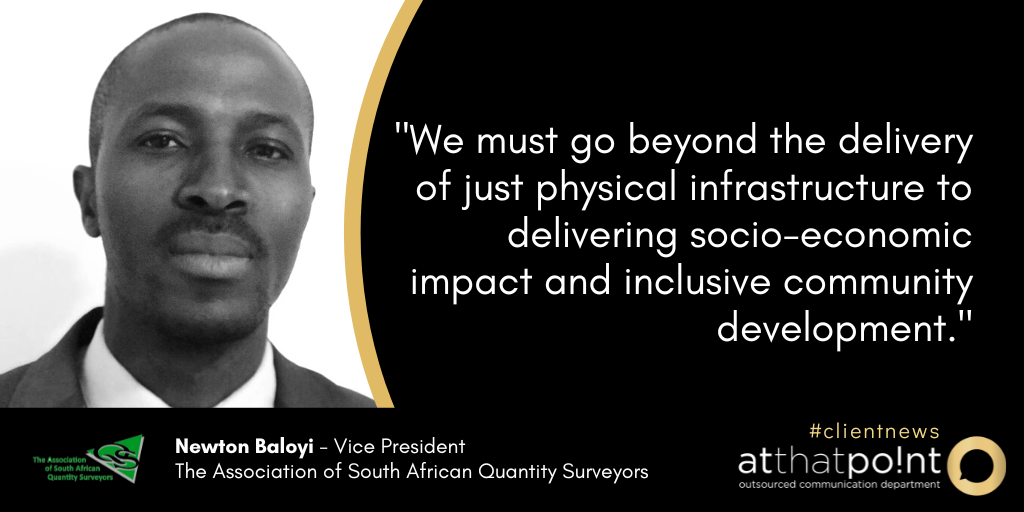
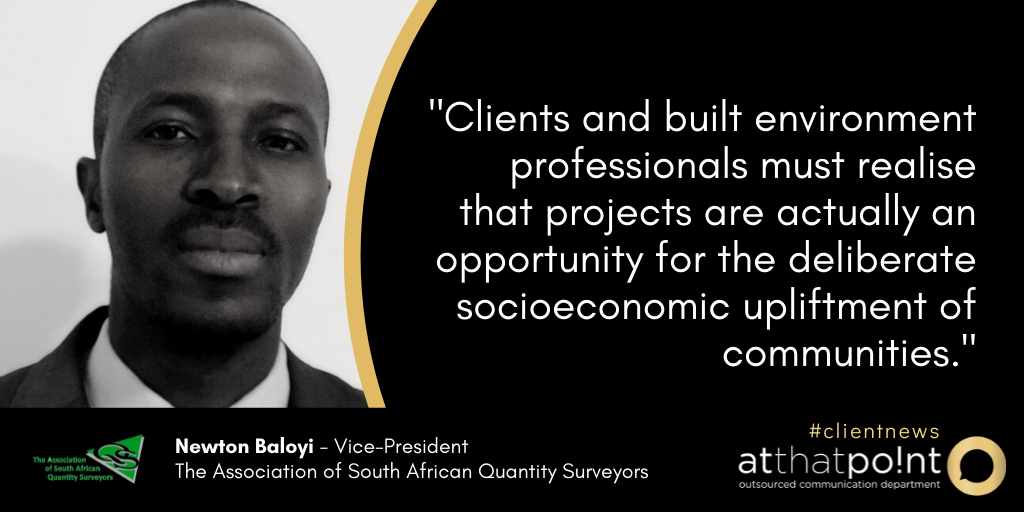
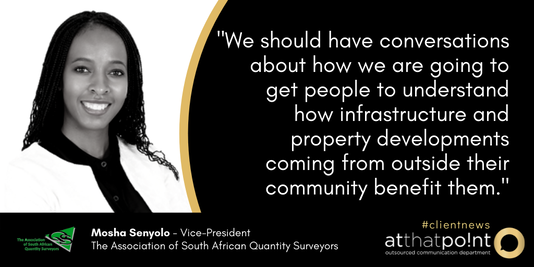
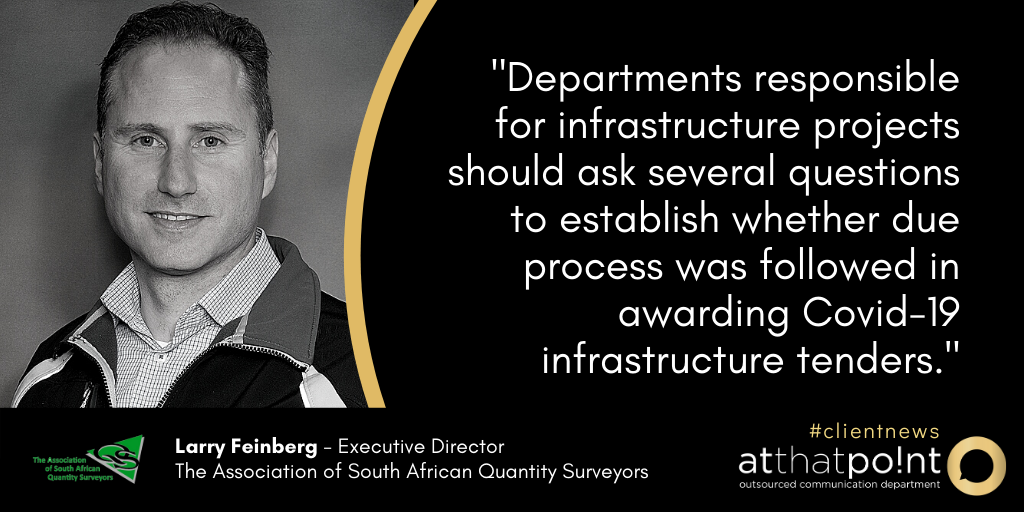
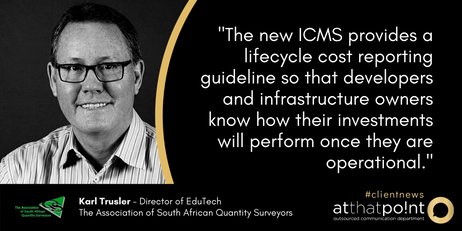
 RSS Feed
RSS Feed